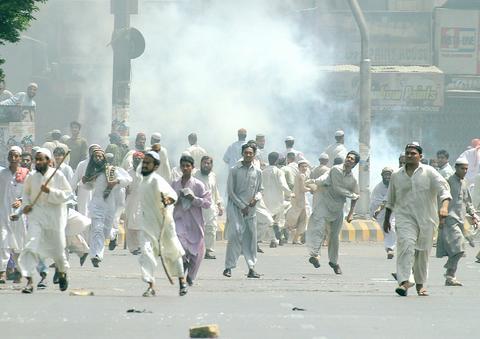Unidentified gunmen shot a senior Sunni Muslim cleric in this violence-prone city yesterday, killing him and wounding four other people, and sparking unrest by his supporters who set fire to a police station, police said.
The pro-Taliban cleric -- Mufti Nizamuddin Shamzai -- was attacked by gunmen riding in two cars and a motorcycle as he traveled in a pickup truck to an Islamic seminary that he headed in an eastern Karachi neighborhood, police official Fayyaz Qureshi said.

PHOTO: REUTERS
A Shamzai bodyguard returned fire and wounded one of the six attackers, Qureshi said, quoting witnesses.
Shamzai died of gunshot wounds in a nearby hospital. Among the four people who were injured in the attack on Shamzai was one of his sons, a nephew, his driver and one bodyguard, Qureshi said.
Shamzai, who was in his 70s, headed Jamia Islamia Binor Town religious school, where thousands of students get Islamic education.
After the shooting, hundreds of his supporters raided a police station near the school, beating up three policemen and setting fire to two cars and more than a dozen motorcycles, said Abdul Rashid, an official at the police station.
Desks and files were strewn on the floor of the station and smoke billowed from the fire.
In nearby Guru Mandar neighborhood, other Shamzai supporters, mainly students of Islamic seminaries, set fire to a branch of a state-run bank and smashed shop windows. They also destroyed billboards and traffic signs.
Calls were being made over loudspeakers at Shamzai's seminary urging his Sunni Muslim supporters to remain peaceful. Some of the supporters were chanting slogans against Shiite Muslims.
Shamzai's funeral was to be held yesterday afternoon, and hundreds were congregating at the seminary to attend it.
No one was arrested for the attack and there was no immediate claim of responsibility.
Karachi -- with 14 million people Pakistan's largest city, and the country's commercial center -- has been the scene of recent sectarian violence and terrorist attacks, including twin car bombings near the US Consul's residence last week. On May 7, a suicide bombing at a Shiite Muslim mosque killed 20 people.
Much of the violence is blamed on Islamic militants, angered by President General Pervez Musharraf's support of the US-led campaign against terrorism in Afghanistan, but clashes between rival Sunnis and Shiites are also common.
Shamzai had met with al-Qaeda leader Osama bin Laden at some point before the Sept. 11 attacks on the US, and the reclusive, one-eyed leader of the Taliban, Mullah Mohammed Omar.

Auschwitz survivor Eva Schloss, the stepsister of teenage diarist Anne Frank and a tireless educator about the horrors of the Holocaust, has died. She was 96. The Anne Frank Trust UK, of which Schloss was honorary president, said she died on Saturday in London, where she lived. Britain’s King Charles III said he was “privileged and proud” to have known Schloss, who cofounded the charitable trust to help young people challenge prejudice. “The horrors that she endured as a young woman are impossible to comprehend and yet she devoted the rest of her life to overcoming hatred and prejudice, promoting kindness, courage, understanding

US President Donald Trump on Friday said Washington was “locked and loaded” to respond if Iran killed protesters, prompting Tehran to warn that intervention would destabilize the region. Protesters and security forces on Thursday clashed in several Iranian cities, with six people reported killed, the first deaths since the unrest escalated. Shopkeepers in Tehran on Sunday last week went on strike over high prices and economic stagnation, actions that have since spread into a protest movement that has swept into other parts of the country. If Iran “violently kills peaceful protesters, which is their custom, the United States of America will come to

‘DISRESPECTFUL’: Katie Miller, the wife of Trump’s most influential adviser, drew ire by posting an image of Greenland in the colors of the US flag, captioning it ‘SOON’ US President Donald Trump on Sunday doubled down on his claim that Greenland should become part of the US, despite calls by the Danish prime minister to stop “threatening” the territory. Washington’s military intervention in Venezuela has reignited fears for Greenland, which Trump has repeatedly said he wants to annex, given its strategic location in the arctic. While aboard Air Force One en route to Washington, Trump reiterated the goal. “We need Greenland from the standpoint of national security, and Denmark is not going to be able to do it,” he said in response to a reporter’s question. “We’ll worry about Greenland in

PERILOUS JOURNEY: Over just a matter of days last month, about 1,600 Afghans who were at risk of perishing due to the cold weather were rescued in the mountains Habibullah set off from his home in western Afghanistan determined to find work in Iran, only for the 15-year-old to freeze to death while walking across the mountainous frontier. “He was forced to go, to bring food for the family,” his mother, Mah Jan, said at her mud home in Ghunjan village. “We have no food to eat, we have no clothes to wear. The house in which I live has no electricity, no water. I have no proper window, nothing to burn for heating,” she added, clutching a photograph of her son. Habibullah was one of at least 18 migrants who died